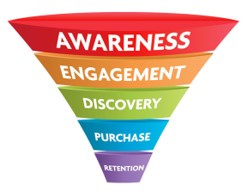We all undoubtedly want visitors on our website to take specific actions. That is why there is a new strategy called marketing funnel. In this article, I am going to introduce you to what funnel is and discuss some of its benefits.
What is a Marketing Funnel?
 A marketing funnel is a strategy where you break down your customers’ journey to learn about your business’ website, how customers interact with it and end with the stage where they’re ready to buy your product or service. A marketing funnel, also known as a purchase funnel, is the set of steps a visitor goes through before they can reach the desired conversion.
A marketing funnel is a strategy where you break down your customers’ journey to learn about your business’ website, how customers interact with it and end with the stage where they’re ready to buy your product or service. A marketing funnel, also known as a purchase funnel, is the set of steps a visitor goes through before they can reach the desired conversion.
Initially, you attract potential clients to your website via any of the marketing and advertising tools you utilize. Then, you persuade the visitor to share their email with you. Then, you send an email to the potential client and try to get them to engage with your product or service. Finally, now that you have acquired new customers, make sure that they are happy and that they will recommend your business or brand to their friends.
In the end, we want our website potential clients to make a purchase or call us from their mobile phone, sign up for an email newsletter, or fill out our website contact form. When a visitor does something, we want them to do it through our website so we get a tracked conversion. In simple words, the visitor converts from browsing to taking the action you want them to take.
There is not a single agreed-upon the various versions of the funnel; some have many “stages,” while others have few, with different names and actions taken by the business and consumer for each. However, all of the funnels follow the same concepts:
- Create awareness for your brand, product, or service.
- Pique interest and engage in what you have to offer.
- Evoke a desire to purchase through education and discovery.
- Move leads through the funnel to the final purchase.
- Help leads perform a desirable action for retention.
Widen the Marketing Funnel
As we mentioned before, a marketing funnel will structure your customer’s journey through your website. From the stages where the potential client learns about your business to the purchasing stage, the marketing funnel map the routes to conversion and beyond.
In the set of steps that lead to conversion, there are a lot of people who take the first step, which is knowing and visiting your website. Then, as the visitor continues along and takes the next steps, some of them leave your site, and the size of your audience narrows. The top of the funnel is when visitors arrive at your website. Only the most interested visitors will move further down your funnel.
Widening the funnel means to cast a larger population of visitors by advertising to new audiences, increasing your brand awareness, adding inbound marketing, etc. to drive more people to your website. The purpose is to get more visitors through each stage to maximize the conversion at the end of the funnel.
You need to figure out what your website goals are and what you want visitors to do on your website. Knowing this, you can create a funnel for it. You can strategize funnels all over your site and see how visitors move through a specific website flow.
You must funnel potential clients down to get that amazing new client, and you can develop the funnel into these stages:
- Attract > Bring visitors to your website through marketing and advertising tools.
- Convert > Engage your visitor with your site content to inspire them to share their contact information.
- Close > Efforts that encourage leads to close and become paying customers.
- Delight > Keep your customers happy with quality services that will inspire referrals.
Benefits of a Marketing Funnel
Marketing funnels can be applied to any desired customer interaction within your website. Whether you are looking for online sales, generating leads and traffic for your store, or collecting clicks as an affiliate, you need a marketing funnel. The funnel is a powerful way to bring visibility to every stage of connecting with your customers.
One of the most significant benefits of a marketing funnel is its measurability. The funnel can show where you’re losing customers to help pivot your strategy. As an example, if you are losing customers before they ever get to the second stage of your funnel, you need a better brand awareness campaign.
Funnels help to increase your website’s conversion rate. The number of visitors browsing your site will narrow, but the visitors who stay are the ones who are more likely to pay for your offerings. This means that non-targeted visitors will be filtered out by the funnel. The ones who stay are more likely to buy or are going to buy more, thereby boosting the conversion rate.
Since the funnel can be measurable, you can predict sales volume through the funnel. Numbers are integral to digital marketing. They can help to improvise an existing strategy and developing new ones. With a funnel, you can predict your volume because it shows how many customers move onto the further stages.
With a marketing funnel, you can identify problem areas too. A funnel can help in identifying products or services that are problem areas. When potential customers exit the funnel, you can trace it to the stage they left, and this reveals the cause. This data can be useful for creating an excellent marketing strategy.
Learning and adopting a marketing funnel can benefit your business in several ways, including:
- Like content marketing, funnels help discover the strategies that will help your visitors the most.
- Funnel stages help to understand the motivations that drive your potential clients to research and purchase.
- Realize why a specific marketing strategy, like the download of white papers, only works at certain funnel stages.
- Find out how and when to nurture relationships with potential clients and current customers.
- Build a practical plan for marketing to users at different stages of the funnel.
Once we have the funnel in place and begin to apply the right strategy at every stage of the funnel, you will start to see more significant benefits as your business goals are achieved much faster.
Summary
There are different marketing funnel options we can focus on. The importance is that your brand should have a logical, practical, and effective marketing funnel in place so you can attract potential clients and convert them into paying customers.
A great website contains information that influences the visitor’s decision to take immediate action. It provides easy to follow steps. Ultimately, your marketing funnel sorts the serious prospects from the passersby and results in a much higher conversion rate.
Remember that with a proper marketing funnel, you can control consumer behavior from a broad to narrow sense. Consumers become aware of specific brands at the wide end of the funnel. With careful analysis, a marketing funnel lets you know what your business must do to influence consumers at certain funnel stages.
Authorship: Arturo S.






























